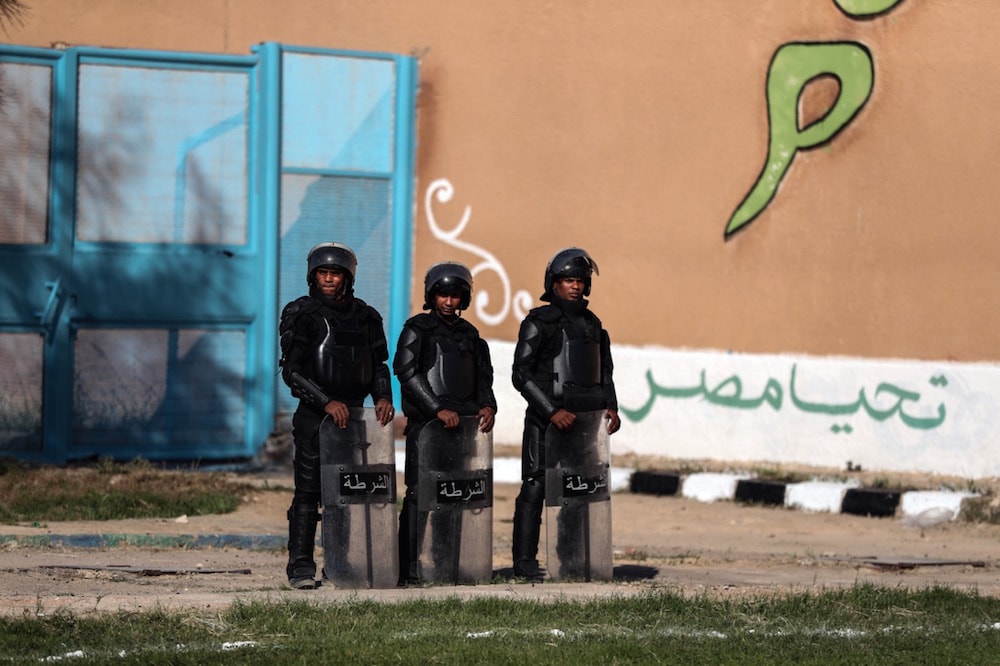IFEX members call for an end to the arbitrary revival of old cases targeting human rights defenders as a mechanism designed to keep them behind bars.
This statement was originally published on anhri.info on 22 January 2020.
The undersigned human rights organizations denounce the Supreme State Security Prosecution’s illegitimate practice of “recycling cases,” and call for its immediate discontinuation. The renewal of Mohamed al-Qassas’ detention yesterday, January 21st 2020, is the latest injustice incurred by the “recycling” or arbitrary revival of cases, a practice increasingly deployed against human rights defenders, journalists, political opponents and others perceived as critical of the Egyptian government. Frequently used to re-imprison released detainees, “recycling cases” occur when a new case is brought by the Supreme State Security Prosecution against someone who has served or is still serving a previous sentence. The new cases, which are in effect simply revived versions of the old cases against the defendants, are solely and entirely reliant upon the notoriously untrustworthy national security investigations of the Interior Ministry.
The detention of Mohamed al-Qassas, deputy president of the opposition party Strong Egypt, was renewed yesterday for 15 days by the Supreme State Security Prosecution, in connection with a new case that had been brought against him, no. 1781 of 2019. This came after his release on December 8th of last year in Case no. 977 of 2017, after he had served two years in solitary confinement at a high-security prison. The current case, based on “national security investigations” only, accuses al-Qassas of organizing meetings inside his solitary prison cell, as well as joining a terrorist group and financing it from inside the prison.
Used to keep an ever-growing number of peaceful critics of Egypt’s authoritarian government perpetually behind bars, cases are “recycled” primarily in two ways. In the first, an activist is released for weeks or months after being detained on dubious charges, and then is re-arrested in a new case for the same or similar charges – as occurred in the cases of lawyer and activist Mahienour el-Masry and lawyer Mohamed Hamdoun. In the second, verdicts are issued to release detainees; however, the verdict is never actually implemented. Instead, the detainee remains imprisoned or is disappeared for a while and then re-appears charged under a new case.
Many individuals prosecuted under politicized or duplicitous charges remain perpetually ensnared in Egypt’s prison system, ranging from prominent activists, journalists, and bloggers to ordinary citizens. Blogger Islam al-Refaei, known as (5orm), was investigated in Case no. 441 of 2018 after he was released on bail on August 14, 2018, after being detained under Case no. 977. He was charged under the new case with contacting Amnesty International and Human Rights Watch from inside the prison facility, according to national security investigations. Al-Refaei remains in pre-trial detention. Adel Sabri, a journalist and editor-in-chief of the Masr Al-Arabia news website, remains detained in pre-trial detention for investigations under the same case, after receiving a court verdict for his release on 10,000 LE bail in another case. He had served over a year and a half of pre-trial detention pending the two cases.
Lawyer Ibrahim Metwally, founder of the Association of the Families of the Disappeared, remains in pre-trial detention, once again, pending a new case, no. 1470 of 2019. Metwally was accused of joining a terrorist group and of involvement in terrorist financing crimes, just two weeks after his release on October 15 from the first case (no. 900 of 2017), after spending two years in solitary confinement.
Security forces arrested Ola al-Qaradawi, daughter of an Islamic cleric, on June 30, 2017, and after she spent a year in solitary confinement, the Criminal Court decided to release her with precautionary measures. However, a new investigation report issued by the national security services halted the verdict’s implementation, and her imprisonment was yet again renewed pending a new case, where she was accused of participating – from inside a prison cell where she was solitarily confined – in the financing of a terrorist group.
The undersigned organizations condemn the Supreme State Security Prosecution’s reprehensible conduct in solely relying upon national security investigations to re-imprison people who had been released. These investigations lack not only evidence and transparency, but as starkly illustrated in the above cases, they are utterly devoid of logic as well. Why are the new cases only disclosed after the release of the accused, when – if the investigations were legitimate – the authorities would have known of the accused’s crimes well before their release? Furthermore, it is unfeasible for prisoners to finance terrorism, join terrorist groups and organize meetings of these groups, all while being held in solitary confinement. And if these crimes were to have been carried out from inside the prison, this would have only been possible with the complicity of the prison guards and administration.
The patently untenable and illogical legal premises upon which ‘recycling cases’ is based exposes this practice, not as an instrument of justice, but rather, as an instrument of repression: simply further evidence of executive tampering with Egypt’s justice system to silence any dissent to the state’s authoritarian rule.
Signatory Organizations
- Cairo Institute for Human Rights Studies
- Arabic Network for Human Rights Information
- Association for Freedom of Thought and Expression
- Committee for Justice
- Egyptian Front for Human Rights
- Freedom Initiative
- Nadeem Center



